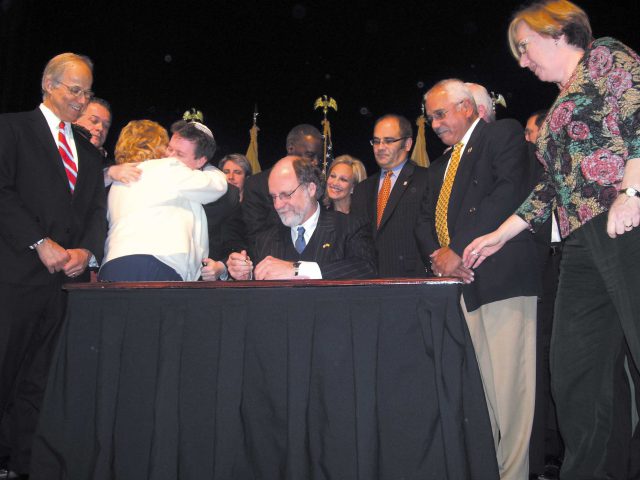According to a report released by a special commission in New Jersey, the state’s one-year-old civil union law creates a “second-class status” for same-sex couples and poses particular challenges for minorities, transgender individuals, the poor and members of the military. Despite the noted shortcomings, the 12-member commission assigned to review the law did not make any recommendations in favor of same-sex marriage in the report, which was released on Feb 20.
Composed of lawyers, ministers, advocates and government officials from agencies that provide benefits to couples in New Jersey, the committee based the report largely on testimony at three public hearings last year. Some of the general complaints about civil unions charged that, as a concept, they are misunderstood by employers and the general population, and thereby do not remedy discrimination against LGBT people in the same way permitting same-sex marriage probably would.
More specifically, other testimony indicated that civil unions do not provide enough economic protections for poor people, who often are members of other minority groups. Married couples in which one partner underwent gender reassignment surgery feared that they would need to get a civil union and annul their marriage, and members of the military cited their reluctance to use the term civil union in official documentation for fear it would generate interest from a government that prohibits them from expressing their sexual orientation openly in the service.
Nearly 2,400 couples have obtained civil unions in New Jersey since they were created last year in response to a 2006 State Supreme Court decision ordering the legislature to devise a way to grant equality to same-sex couples. However, evidence in the special report suggests that civil unions are not accomplishing the goal of giving same-sex couples the same rights as heterosexual couples.
Governor Jon Corzine, who acknowledges the inadequacies of civil unions, has stated that he would sign a same-sex marriage bill but would not do so before the November elections. Same-sex marriage activists, emboldened by the findings of the report, have indicated that they may challenge the governor’s preferred timeline.


What Do You Think?